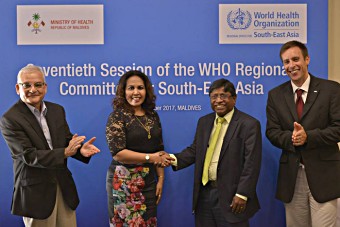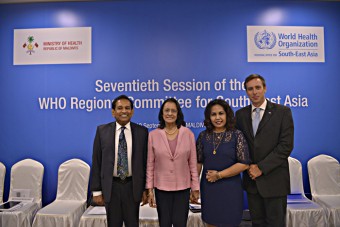'Twinning' is winning: landmark Sri Lanka/Timor-Leste immunisation agreement

Left to right: Dr Arun Thapa (WHO), Dr Odete da Silva Viegas (Timor-Leste), Dr J.M. V. Jayasundra Bandara (Sri Lanka) and Charlie Whetham (Gavi) at the signing ceremony. Credit: WHO/2017.
Male, the Maldives, 9 September 2017 – The Governments of Sri Lanka and Timor-Leste have signed an unprecedented agreement, which will see Timor-Leste’s immunisation programme draw on lessons learned from Sri Lanka’s successful transition out of Gavi support.
Signed at the WHO regional committee meeting for South East Asia region in the Maldives and facilitated by WHO Timor-Leste, the so-called ‘twinning agreement’ will help strengthen the effectiveness of immunisation management bodies in Timor-Leste, such as the Expanded Programme on Immunization (EPI). The performance of these institutions’ is vital for an immunisation system to become programmatically and financially sustainable.
Model example
Sri Lanka is considered a model example of how to build a sustainable immunisation programme. Transitioning out of Gavi support in January 2016, the government is now in the second year of fully self-financing its vaccines. Timor-Leste is hoping to follow Sri Lanka’s same path to transition.
“I congratulate the governments of Sri Lanka and Timor-Leste on this landmark agreement,” said Gavi Deputy CEO Anuradha Gupta. “This is an important milestone for Gavi and we are proud to support the transfer of knowledge, technology, skills and competencies from Sri Lanka. They will undoubtedly play a critical role in strengthening Timor-Leste’s immunisation programme.”
Gavi transition grant
The ‘twinning’ agreement will help Timor-Leste address several challenges to its successful transition raised in a 2016 Gavi assessment of the strengths and weakness of its Expanded Programme for Immunization (EPI). Following the assessment, Gavi approved a transition grant specifically designed to help improve the performance of the country’s immunisation management bodies, particularly the EPI.
“Twinning arrangements of this kind are key to making sure that countries like Timor-Leste have robust systems and decision-making processes in place to continue protecting children with vaccines,” says Hind Khatib-Othman, Gavi Managing Director for Country Programmes.
First time
Under the terms of the two-year agreement, EPI officials selected from both national and local offices in Timor-Leste will visit Sri Lanka to study firsthand how its immunisation programme sustains 99% immunisation coverage rates. It is the first time that a Gavi-supported country will provide a combination of mentoring, coaching and exchange visits to strengthen the institutional capacity of another Gavi-supported country.
“We look forward to better understanding all of the components and approaches of Sri Lanka’s immunisation programme and applying the lessons learned at home,” said Dr Odete da Silva Viegas, General Director of Health Services Delivery at Timor-Leste’s Health Ministry.
Transfer of skills
The programme will facilitate the transfer of programme management skills including planning and budgeting, vaccine logistics, use of data to track progress and improving coverage. It will also provide opportunities for exchange visits between both EPI teams and build a coaching plan that will incorporate distance mentoring. WHO, with Gavi funding, will provide support to each exchange visit and will monitor the follow-up.
“It is a unique opportunity for Sri Lanka to showcase our success, regionally and nationally. It will also build capacity of our staff for mentoring and coaching for potential future twinning arrangements of this kind,” said Dr J.M. V. Jayasundra Bandara, Director General of Health Services at Sri Lanka’s Health Ministry.

Left to right: Dr Rajitha Senaratne (Minister of Health, Sri Lanka), Dr Poonam Khetrapal Singh (WHO Regional Director), Dr Odete da Silva Viegas (Timor-Leste) and Charlie Whetham (Gavi). Credit: WHO/2017.
Gavi’s commitment to sustainable immunisation
The Sri Lanka-Timor Leste agreement could be the basis for similar knowledge-sharing between Gavi-supported countries preparing to fully-fund their immunisation programmes.
“At Gavi, we do not just help countries expand their national immunisation programmes,” said Hind Khatib-Othman, Gavi Managing Director for Country Programmes. “We also aim to make immunisation sustainable, both financially and programmatically, so that countries can sustain high coverage and equal access to vaccines after Gavi support ends”.
What partners said about the ‘twinning’
“This twinning project is a unique example of a country-driven cooperation which is fundamental to the success of the Gavi model.”
Gavi Deputy CEO Anuradha Gupta
“This twinning agreement will be extremely beneficial for Timor-Leste and I would like to thank the Ministry of Health of Sri Lanka for their readiness to share their knowledge and technical skills with my team.”
Dr Odete da Silva Viegas, General Director of Health Services Delivery at Ministry of Health of the Democratic Republic of Timor-Leste
“We are humbled and honoured to share the best practices of our EPI programme with the EPI programme of Timor-Leste.”
Dr J.M. V. Jayasundra Bandara, Director General of Health Services (a.i.) at Ministry for Health, Nutrition & Indigenous Medicine of Sri Lanka
"The twinning agreement builds a unique knowledge sharing platform which is mutually beneficial."
Dr Rajesh Pandav, WHO Representative to Democratic Republic of Timor-Leste.
